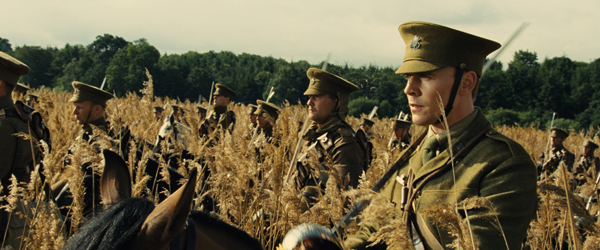“Everyone has lost something in the war.”
The H-Bomb: Like many in my generation, I have grown up with the movies of Steven Spielberg. Be it Indiana Jones or “Jurassic Park”, “E.T.” or “Jaws”, the man has an ability to create pure magic on film in a way that really no one else can. Or at least he did. To be perfectly honest, I don’t think this past decade has been Spielberg at his best. “A.I.: Artificial Intelligence” had interesting aspects, but didn’t really work as a whole. Ditto for “Minority Report”. “Catch Me If You Can” went in one ear and out the other. “The Terminal” I would argue is a genuinely bad movie, as is his remake of “War of the Worlds”. And don’t even get me started on “Indiana Jones and the Kingdom of the Crystal Expletive Deleted”. For me, the only good film he’s made in the last ten years was “Munich”, which I do feel is a terrific movie that didn’t get anywhere near the recognition it deserved. But that one aside, I can easily live without anything else he’s done. Not to mention the man seems to have forgotten how to end a movie, filling them full of false endings and making them run at least a half hour longer than they should.
For all intents and purposes, it looked to me like the bearded one had lost his touch. That’s why I was so pleasantly surprised by “War Horse”, a film that is harrowing and moving, and sees Spielberg back in fine form. Based on the novel by Michael Morpurgo, it tells the story of a down on his luck farmer (Peter Mullan, “Session 9”) who purchases a horse to work in his field just as the first World War is about to begin. His wife (Emily Watson), thinks that the animal is useless and wants to get rid of it, but his son, Albert (Jeremy Irvine, excellent) immediately takes a liking to the gorgeous young horse and names it Joey. When it looks as though the horse can’t be trained, Albert prevents his father from giving Joey a buckshot shampoo and sets about training the horse himself, and then defies the odds by doing exactly that. But before long a storm rolls in and destroys the crops. Completely broke, and with no way to pay the rent, the farmer is forced to sell Joey to a young British Army Officer, who intends to ride him into battle.
After Albert’s tearful pleas for him not to take the horse, the officer gives him his word that if he can, he will return Joey to him after the war. But World War I was a particularly messy war in which nothing went according to plan, and over the course of four years, Joey finds himself being shuffled between many different owners and masters, on both sides of the conflict. Each owner is very different from the last, but they all share one thing in common, they are all able to recognize that this is a very special horse that they have in their care. Once he is old enough, Albert joins the army and goes off to fight, in hopes that he will be reunited with Joey.
“War Horse” is, a few minor flaws aside, an absolute triumph for Spielberg. It has all the elements from Spielberg’s best films; it’s touching, if a tad sentimental, emotional, and rousing. Fantastically crafted with stunning cinematography, it, much like “Saving Private Ryan” did, captures the visual beauty of everything, even something as ugly as war. It’s theme of Albert’s unbreakable bond with Joey is one that will surely resonate with anyone who has ever owned and cherished a pet. If there’s one thing Spielberg does better than anyone else, it’s being able to strike an emotional chord in the audience, and that’s very much evident here.
As the title clearly indicates, this is about a horse that goes off to war, so it’s easy to surmise that the horse is placed in jeopardy on a number of occasions. The most grueling of which being when Joey gets himself “tangled” in the middle of no man’s land. The sequence is difficult to watch, but plays out in a way that is rewarding and very “Spielbergian.” It tugs on the heart strings, perhaps a little too deliberately, and if you’re one who is inclined to shed tears, then I recommend bringing tissues. For the record, I’m not and I didn’t. Cynics may condemn Spielberg for being emotionally manipulative, but frankly, who gives a rat’s rectum what they think? For me, it worked, as I’m sure it will for most.
As for complaints, I would say there are times, mainly with character actions and the way certain events unfold, where the story stretched credulity almost too far. It was never so unbelievable that it was absurd, but it did have me thinking, “Come on, would that really happen?” Also, there were some interesting characters that I would have liked to have spent a little more time with, like the two German brothers who desert the army, as well as Joey’s German handler on the battlefield. These were people I felt were a little short changed. But the film’s biggest flaw, the one that most of Spielberg’s modern film’s suffer from, is that it’s too damn long. It’s not that it had a series of false endings, but that the first act on the farm, which is kind of dreary, really should have been shortened.
But, these problems are miniscule, as “War Horse” is overall one terrific motion picture. Joey’s journey is long and trying, but it’s one that is very much worth riding along on. It’s not the best film I’ve seen this year, but it’s most definitely up there, and it has left me convinced that Spielberg has not lost his touch, after all.




